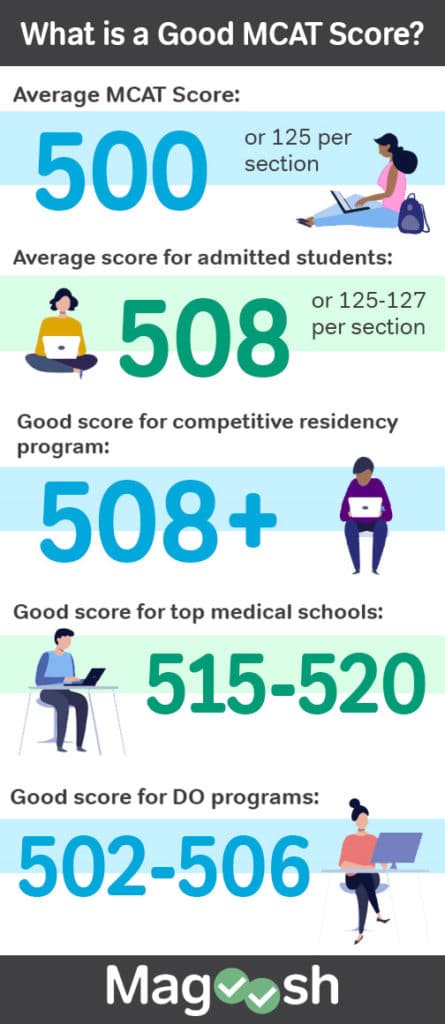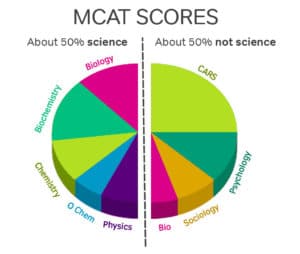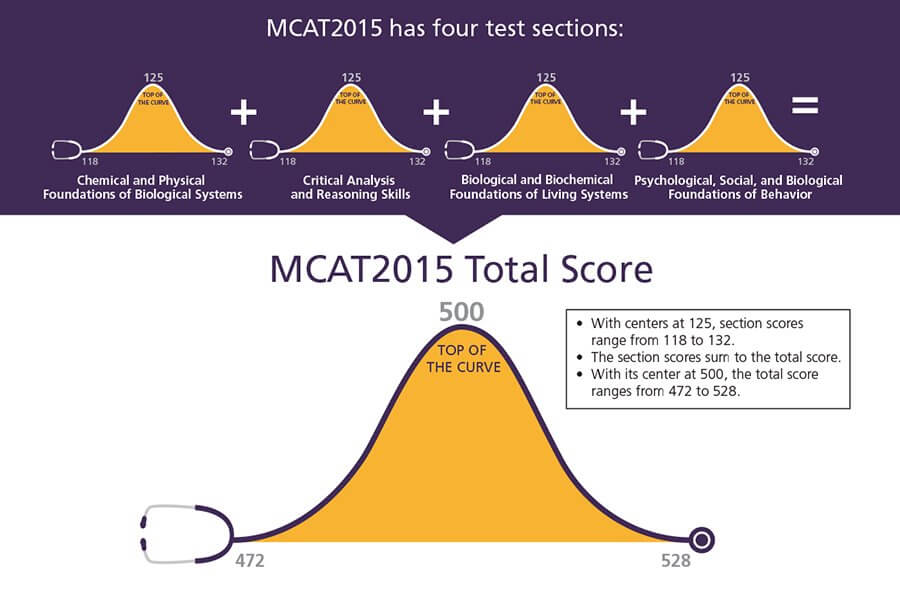
What’s a good MCAT score? is a complex question, but for most test-takers, a good MCAT score is 127-132 per section, or around 508 overall. Top medical schools report an average MCAT score range of 515-520, in the 90th percentile or above. How did we arrive at these numbers? The numbers above are based on the average MCAT scores of students admitted to all medical schools.
When setting your specific goals, though, we recommend aiming for an MCAT score that falls at or above the 50th percentile of MCAT scores for the most recent matriculants admitted to your med school(s) of choice. If you have a specific school in mind, you should set your minimum MCAT goal score at the center of that school’s specific average.

Note: When it comes to residency programs, many don’t look at your MCAT scores or give them much weight, but an unusually low score might get noticed.
Different factors should influence your score goals, though, and this infographic compares different categories of MCAT scores that could be considered “good.” In this post, we’ll take a look at some of the most important categories.
- For the most current data, check out our post on MCAT scores and GPAs for the top 100 medical schools!
Table of Contents
- Average MCAT Scores
- Is a perfect MCAT score possible?
- What is a bad MCAT score?
- MCAT Score Range
- What is a Good MCAT Score for DO School?
- A Final Word on MCAT Scores
Average MCAT Scores
While you definitely should research the scores associated with the particular schools you’re interested in, it can also be helpful to look at the worldwide averages.
In the most recently released MCAT percentiles, in effect from May 1, 2025 through April 30, 2026: The average total score was 500.5, and the standard deviation was 11.2. There were 293,882 administrations of the MCAT from 2022 to 2024.
The 50th percentile score is around 501. As you might have guessed, an average MCAT score is not a golden ticket to medical school. After all, half of all test-takers score above average.
The table below can help assess where you stand in the larger pool of MCAT test-takers and medical school applicants. For those of you interested in the best of the best, we also included the average MCAT scores for the most recent incoming class at Harvard Medical School.
Average MCAT Scores by Type
| Category | MCAT Score |
|---|---|
| Average MCAT Score for All Test Takers | 500.5 |
| Average MCAT Score for All Applicants to Medical School | 506.1 |
| Average MCAT Score for All Matriculants to Medical School | 511.8 |
| Average MCAT Score for the 2020 Entering Class of Harvard Medical School | 520.42 |
Breakdown of average MCAT scores for all test takers, for all applicants to medical school, for all matriculants to medical school, and for the 2028 entering class at Harvard Medical School.
Table from AAMC and Harvard, 2025
![]()

This pie chart illustrates the approximate breakdown of your MCAT score by section. About half your score is made up of science sections (Bio, Chem, Phys), and the other half is composed of non-science sections (CARS, Psych and Soc).
Is a perfect MCAT score possible?
A perfect MCAT score is a 132 in all four sections (Chemical and Physical Foundations of Biological Systems; Critical Analysis and Reasoning Skills; Biological and Biochemical Foundations of Living Systems; Psychological, Social, and Biological Foundations of Behavior) for a total combined score of 528.
If you look at the current percentile ranks for the MCAT exam, you will see that this is no easy feat. Less than 1% of all test-takers receive a 132 for any of the section scores of the exam. To get a 132 in all four sections is very unlikely. As a score of 521 is already the 98th percentile, the number of perfect scores is far lower than 1% of all test-takers.
In other words? If you’re a few points away from a perfect score, it’s likely not worth stressing about getting those very few additional questions correct on a retake (even if you really want that perfect 528 on your next MCAT score report!). Instead, focus on polishing the other parts of your application.
![]()
What is a bad MCAT score?
Simply put, a bad MCAT score is a score that does not get you where you want. For many people, taking the MCAT is a means of getting into medical school. Everyone has different goals for medical school and every medical school is different as well. The key to answering this question is understanding your goals and doing the research on how your score helps or hurts your goals (more on this later!).
But remember: your test score is not the only factor that the admissions committee considers when looking at your application! While getting a top score can open up more doors for you, the programs will also look at factors including your undergraduate GPA, your personal statement, your letters of recommendation, extracurricular activities, and other factors that go far beyond your score reports.
Will a high GPA compensate for a lower-than-average score on the Medical College Admission Test? It really depends on the school, as well as how much higher your GPA is than the average GPA for admitted students in that program.
In short, if you have a “bad” score that falls into the lower MCAT scores range for programs that interest you, you might want to consider retaking the MCAT on a later test date. Be sure to check deadlines and see if there’s enough time left in the application cycle to schedule another MCAT test date.
![]()
MCAT Score Range
Total score ranges by section are 118-132, and the total possible MCAT score range is 472-528. These scaled scores are different from the “raw score,” which is the number of questions per section that you answer correctly. See the graphic below for a visual of how MCAT score ranges work.
 Figure from AAMC (PDF), 2015
Figure from AAMC (PDF), 2015
![]()
What is a good MCAT Score for DO school?
If you’re applying to DO school, a good MCAT score might mean something a bit different. Good scores for DO programs range from about 502-506. While this is lower than the “Good” MCAT scores listed for MD programs above, this doesn’t mean that DO schools are less competitive. Overall, they actually have lower acceptance rates than medical schools, because there are fewer of them overall and they have to turn away more applicants. However, DO programs are less likely to emphasize the MCAT as much in the admissions process as MD programs.
![]()
A Final Word
If you are looking for tips to get that good MCAT score you want, we recommend that you read our Top Tips for MCAT Studying and the Biggest Study Mistakes on the MCAT. You can also test your MCAT skills with Magoosh’s free MCAT diagnostic test! This can help you narrow down areas to focus on in your prep, from biology/biological sciences to the reasoning skills section.
There are many ways to raise your test score, and it really boils down to finding the right option for you. Our Magoosh online MCAT course is an option that works best for students who like to set their own studying pace.
If you prefer a more structured plan, you can also make use of MCAT study schedules where you can prepare for test day within one month or more.
Good luck! 🙂
A big thank you to MCAT bloggers Ken and April for their contributions to this post!








